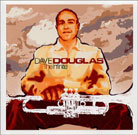June 2002
The musical influence that helped Douglas shape The Infinite is obvious to all, even without reading the (rather skimpy) liner notes: Miles Davis, in all his varied forms. Douglas seems to have gone out of his way to sound as much like Davis as possible, both conceptually as well as musically, while never stooping to mere imitation. Ironically, he accomplished this without using any of the music usually associated with Davis. Instead, he wrote fresh music -- so fresh that if someone played it for you, under the guise of undiscovered Davis recordings, I doubt you’d find a reason to question them. The Infinite draws on the styles of many of Davis’ groups over the years, from the first great quintet (of Davis, Coltrane, Garland, Chambers and Jones), through the early Columbia years (liberally substitute Adderley, Coleman, Evans, Kelly, or Cobb), the second great quintet (of Davis, Shorter, Hancock, Carter and Williams), all the way to Miles’ fusion years. Even with CD's extended playing time, that’s still quite a bit of ground to cover. Aiding Douglas are his sidemen, Chris Potter on tenor sax and bass clarinet, Uri Caine on Fender Rhodes, James Genus on bass, and Clarence Penn on drums. And while none of these musicians ever played with Miles (to the best of my knowledge), all, as evidenced by their playing here, absorbed a lot from all of Davis’ working groups. For example, take a listen to "Waverly." Douglas and cohorts coax a sound that could very well be mistaken for an outtake from Kind of Blue. Or try "Yorke," and see how the lessons learned from Miles’ second great quintet were applied. As you listen to The Infinite, close your eyes and let yourself go. It can get downright spooky how Milesian these guys sound. Speaking of sound, the sonics here are first-rate. But then, what would you expect when you have Joe Ferla as your engineer and Mark Wilder doing the mastering? These two have some of the best ears in the business today. Listen to the bite given to Douglas’ trumpet. It’s as real-sounding as CD gets. And it’s easy to follow both the trumpet and Potter’s sax when they play together. Each instrument occupies its own acoustic space. Those older audiophiles listening will recognize the sonic signature of Caine’s Fender Rhodes. It’ll put you in the way-back machine and get you pulling those old fusion albums out of your collection again. (I don’t know why it’s not used more often today. It has such a unique sound.) The soundstage is somewhat restrained, being only speaker to speaker. But there is enough depth present to keep you satisfied; the musicians never sound as though they’re piled one on top of one other. The Infinite is at once one of Douglas’ more accessible and one of his most challenging albums. Its accessibility comes from the familiarity of its musical styles; its challenge stems from the newness of the written material used to cover all those differing styles. Once again, Douglas has surprised both his fans and critics alike by creating another in a long string of original albums. That may very well be one of the highest compliments that can be paid a musician today. On album after album, Douglas continues to challenge our conceptions as to what his music should sound like. The Infinite is an easy recommendation, and quite possibly the album of the year. GO BACK TO: |
 Dave Douglas - The Infinite
Dave Douglas - The Infinite![[Reviewed on CD]](../format/regcd.gif) Using The
Infinite as the title for multi-faceted jazzman Dave Douglas' latest CD was an apt
choice, for Douglas’ ideas on jazz are infinite in their variety. Just when you think
you’ve got him pegged, bang, he pops up in the most unexpected places. This is
the man, who, not that long ago, juggled three completely different groups, and made all
of them good.
Using The
Infinite as the title for multi-faceted jazzman Dave Douglas' latest CD was an apt
choice, for Douglas’ ideas on jazz are infinite in their variety. Just when you think
you’ve got him pegged, bang, he pops up in the most unexpected places. This is
the man, who, not that long ago, juggled three completely different groups, and made all
of them good.